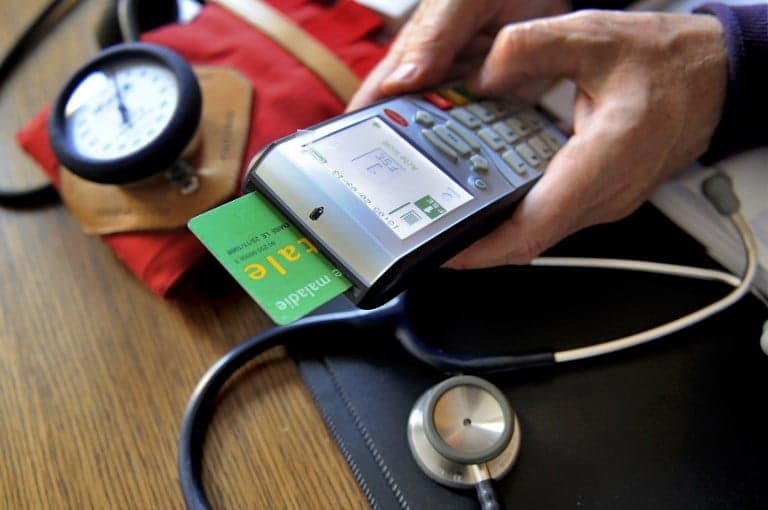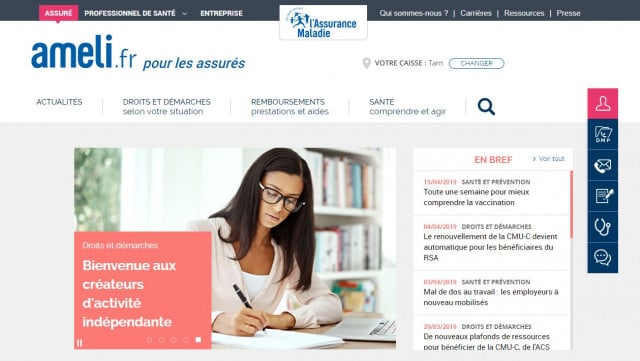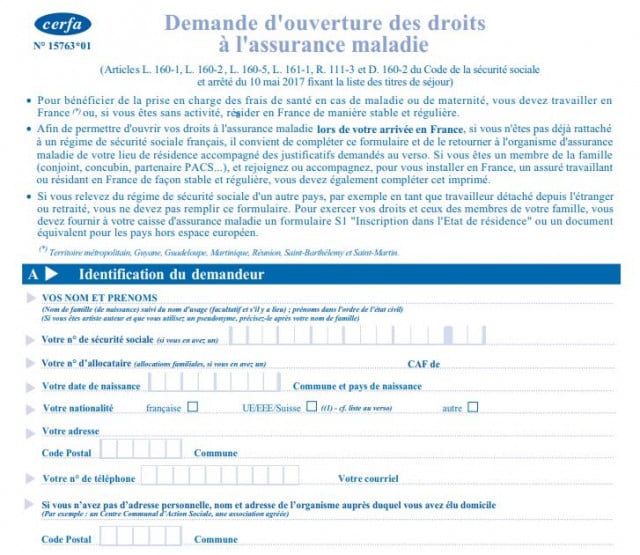How to get a carte vitale in France and why you need one

Applying for the health card carte vitale will get you free or discounted healthcare, but it will also make sure you are in the French social security system.
The carte vitale is the national French health insurance card that allows those who have one to have most or all of their health costs either covered or reimbursed by the state.
The cards work mainly as a reimbursement system - when you have a doctor's appointment or are prescribed medication, you pay upfront to the doctor or pharmacist.
They then swipe your carte vitale and the government reimburses some or all of the cost directly back into your bank account.
How much of the cost is reimbursed by the state depends on the treatment or action taken by the doctor, the type of doctor you see and your personal circumstances.
So for example cancer treatments are reimbursed at 100 percent, while a dermatology treatment or cosmetic dentistry procedure would be reimbursed at a lower percentage.
Some groups, such as war veterans and pregnant women, are entitled to a higher rate of reimbursement.
A standard appointment with your GP or primary care doctor comes with a set fee of €25, and is reimbursed at 70 percent (so €17.50).
Most people have top up health insurance - known as a mutuelle - to cover the difference (or most of it) between what the state pays via the carte vitale and the total fee.
Who can get a carte vitale?
Anyone who has been legally resident in France for more than three months is entitled to the carte vitale and it is not means tested.
So how to go about it?
Like most things in France, it involves a lot of paperwork, but the system itself is relatively simple.

The French health insurance site Ameli
First you need to get an application form - these are available to download from the French health insurance site - www.ameli.fr.
The form itself is fairly straightforward and just asks for personal details like name, age and address.
It does include a box for a social security number, which you will not have yet - just ignore that. The same form is also used for people who already have a carte vitale but need to change their details.

You will then have to return the form by post to your local CPAM office (find out yours here) accompanied by various documents. You will need:
A photocopy of your passport
A photocopy of your visa or carte de sejour if you are required to have one (not required for EU/EEA or Swiss citizens).
Your birth certificate. This cannot be a copy but must be the original. It must be the full certificate including parents' names (not the shorter certificate that most British people born before 1983 will have) and if it is not in French you will need to include a certified translation of it.
Your bank details - the relevé d'identite bancaire (RIB) that you are given by your bank.
If you are working you will need proof of your employment - either a copy of your contract or a pay slip.
If you are not working but are already in the system - for example as a jobseeker or asylum seeker - you will need to send copies of all the paperwork pertaining to your status.
If you are not working and are not already in the system you will need to send proof that you have been a resident in France for three months, documents accepted include rental contracts, utility bills, phone bills (but only for a fixed line, not a mobile) and, if you are studying, a certificate of study.
If you have children under the age of 18 living with you then you will need to include form S3705 - the Demande de rattachement des enfants mineurs à l'un ou aux deux parents assurés (application for the attachment of minor children to a parent's health insurance). This form is also available to download from the www.ameli.fr site.
Once you have filled in the form and sent off the paperwork you should - if all the papers are correct - get a temporary number.
You then receive a permanent social security number. Once you get your permanent number, you will then get a second form to fill out and send back, together with a passport photo, and then you will be sent out the card.
The final thing to do is to choose a registered GP and fill out a form (declaration de choix du médecin traitant) that formally declares them as your chosen doctor.
READ ALSO How to register with a doctor in France
How long does it take?
The time it takes to get the card varies quite widely - some people report getting theirs within a couple of weeks, others say it took almost a year. It seems that six months is around average, although there are regional variations.
While you are waiting for your card, you can still access healthcare in France.
You pay upfront and then ask the doctor or pharmacist for a feuille de soins - this is essentially a type of receipt that you fill out and, once you have the card, you can claim back any medical costs that you incurred during the waiting period.
While the whole process can be a lengthy one there are several bits of good news.
Firstly the Ameli site has an English section which explains the requirements for different classifications - retired, employed, self employed.
If you're still stuck there is an English language helpline, which is open from 8.30am to 5.30pm, Monday to Friday. Call 0 811 36 36 46 or 09 74 75 36 46 from France or 0033 811 36 36 46 from outside France.
Once you have a social security number you can set up an account on the Ameli site which you can use to track payments and make other changes, for example if you move house and need to change your address.
Ameli: How to set up your online social security account
Finally, it's well worth knowing about the medical website/app Doctolib, which will make booking appointments and finding English speaking doctors a lot easier - full details here.
French vocab
L'assurance maladie - health insurance
Numéro de sécurité sociale - social security number
Médicin traitant - Your registered doctor
Comments (4)
See Also
The carte vitale is the national French health insurance card that allows those who have one to have most or all of their health costs either covered or reimbursed by the state.
The cards work mainly as a reimbursement system - when you have a doctor's appointment or are prescribed medication, you pay upfront to the doctor or pharmacist.
They then swipe your carte vitale and the government reimburses some or all of the cost directly back into your bank account.
How much of the cost is reimbursed by the state depends on the treatment or action taken by the doctor, the type of doctor you see and your personal circumstances.
So for example cancer treatments are reimbursed at 100 percent, while a dermatology treatment or cosmetic dentistry procedure would be reimbursed at a lower percentage.
Some groups, such as war veterans and pregnant women, are entitled to a higher rate of reimbursement.
A standard appointment with your GP or primary care doctor comes with a set fee of €25, and is reimbursed at 70 percent (so €17.50).
Most people have top up health insurance - known as a mutuelle - to cover the difference (or most of it) between what the state pays via the carte vitale and the total fee.
Who can get a carte vitale?
Anyone who has been legally resident in France for more than three months is entitled to the carte vitale and it is not means tested.
So how to go about it?
Like most things in France, it involves a lot of paperwork, but the system itself is relatively simple.
The French health insurance site Ameli
First you need to get an application form - these are available to download from the French health insurance site - www.ameli.fr.
The form itself is fairly straightforward and just asks for personal details like name, age and address.
It does include a box for a social security number, which you will not have yet - just ignore that. The same form is also used for people who already have a carte vitale but need to change their details.
You will then have to return the form by post to your local CPAM office (find out yours here) accompanied by various documents. You will need:
A photocopy of your passport
A photocopy of your visa or carte de sejour if you are required to have one (not required for EU/EEA or Swiss citizens).
Your birth certificate. This cannot be a copy but must be the original. It must be the full certificate including parents' names (not the shorter certificate that most British people born before 1983 will have) and if it is not in French you will need to include a certified translation of it.
Your bank details - the relevé d'identite bancaire (RIB) that you are given by your bank.
If you are working you will need proof of your employment - either a copy of your contract or a pay slip.
If you are not working but are already in the system - for example as a jobseeker or asylum seeker - you will need to send copies of all the paperwork pertaining to your status.
If you are not working and are not already in the system you will need to send proof that you have been a resident in France for three months, documents accepted include rental contracts, utility bills, phone bills (but only for a fixed line, not a mobile) and, if you are studying, a certificate of study.
If you have children under the age of 18 living with you then you will need to include form S3705 - the Demande de rattachement des enfants mineurs à l'un ou aux deux parents assurés (application for the attachment of minor children to a parent's health insurance). This form is also available to download from the www.ameli.fr site.
Once you have filled in the form and sent off the paperwork you should - if all the papers are correct - get a temporary number.
You then receive a permanent social security number. Once you get your permanent number, you will then get a second form to fill out and send back, together with a passport photo, and then you will be sent out the card.
The final thing to do is to choose a registered GP and fill out a form (declaration de choix du médecin traitant) that formally declares them as your chosen doctor.
READ ALSO How to register with a doctor in France
How long does it take?
The time it takes to get the card varies quite widely - some people report getting theirs within a couple of weeks, others say it took almost a year. It seems that six months is around average, although there are regional variations.
While you are waiting for your card, you can still access healthcare in France.
You pay upfront and then ask the doctor or pharmacist for a feuille de soins - this is essentially a type of receipt that you fill out and, once you have the card, you can claim back any medical costs that you incurred during the waiting period.
While the whole process can be a lengthy one there are several bits of good news.
Firstly the Ameli site has an English section which explains the requirements for different classifications - retired, employed, self employed.
If you're still stuck there is an English language helpline, which is open from 8.30am to 5.30pm, Monday to Friday. Call 0 811 36 36 46 or 09 74 75 36 46 from France or 0033 811 36 36 46 from outside France.
Once you have a social security number you can set up an account on the Ameli site which you can use to track payments and make other changes, for example if you move house and need to change your address.
Ameli: How to set up your online social security account
Finally, it's well worth knowing about the medical website/app Doctolib, which will make booking appointments and finding English speaking doctors a lot easier - full details here.
French vocab
L'assurance maladie - health insurance
Numéro de sécurité sociale - social security number
Médicin traitant - Your registered doctor
Join the conversation in our comments section below. Share your own views and experience and if you have a question or suggestion for our journalists then email us at [email protected].
Please keep comments civil, constructive and on topic – and make sure to read our terms of use before getting involved.
Please log in here to leave a comment.